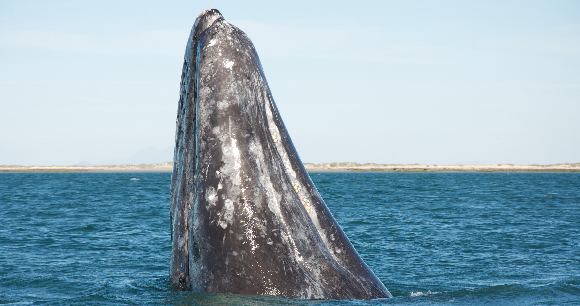
Washington, DC—The Animal Welfare Institute (AWI) is disappointed with yesterday’s decision by federal regulators to issue a waiver of the Marine Mammal Protection Act (MMPA) to the Makah Tribe of Washington state to hunt whales over the next decade. AWI has great respect for the cultural traditions of the Makah Tribe, but does not support killing gray whales as necessary to maintaining and promoting such traditions.
In granting the Makah whale hunt, the National Oceanic and Atmospheric Administration (NOAA) issued a waiver under the MMPA, which, since 1972, has prohibited the harassment, hunting, capturing, or killing of any marine mammal without authorization from the US government.
Eastern North Pacific (ENP) gray whales have been dramatically affected by climate change and ocean warming, with their population nearly cut in half from 2016 to 2023. Gray whales also face a variety of threats throughout their migratory route, including ship strikes, bycatch, ocean noise, and pollution.
“Allowing any hunt of gray whales in US waters, despite evidence of significant climate change impacts to the Arctic and, consequently, gray whale feeding patterns, is reckless and myopic,” said DJ Schubert, senior wildlife biologist for AWI’s Marine Wildlife Program. “The ecological disruptions in the Arctic linked to ocean warming are only getting worse, and the gray whale and other species will suffer the consequences.”
Although estimates released in March suggest that the ENP population may be rebounding, the purported increase from 14,526 in 2023 to 19,260 in 2024 seems biologically implausible. In March 2023, NOAA announced the end of the gray whale “unusual mortality event,” which saw the ENP population decline by 46% from nearly 27,000 whales in 2016 to 14,450 in 2023. According to a study published this year, this decrease was attributed to the decline in gray whale prey in their Arctic feeding areas, causing them to starve. The best available evidence on gray whale calf production this year suggests that calf production continues to be at historically low levels. Gray whale strandings have continued this year in Mexico (19), the United States (at least 15), and Canada (at least one). Moreover, given the dramatic changes in Arctic ecology due to climate change, the future trend in gray whale numbers is uncertain.
AWI remains concerned that NOAA’s decision will fail to sufficiently protect the Pacific Coast Feeding Group (PCFG) or Western North Pacific (WNP) gray whales, which can be found in the same waters as the ENP gray whales. Between 2016 and 2022, PCFG gray whales declined by 21%, from 256 to 202. Despite compelling scientific evidence, the federal government has thus far failed to designate these whales as a distinct management unit, an action that would trigger additional protections. While WNP gray whales are listed as “endangered” under the Endangered Species Act, their current status is unknown; no new population numbers have been published since 2015, when they were estimated at just 290 whales. Yet it will be virtually impossible for the Makah to distinguish between ENP, PCFG, and WNP gray whales while hunting them, making the government’s decision to issue a waiver all the more misguided.
Before the Makah can hunt gray whales, NOAA will require that the tribe meet certain conditions, such as using hunting methods that comply with the humane standards under the MMPA. AWI believes that the proposed hunt will not be able to meet these robust standards and will result in unconscionable suffering, and remains hopeful that this event will not move forward.
Marjorie Fishman, Animal Welfare Institute
[email protected], (202) 446-2128
The Animal Welfare Institute (awionline.org) is a nonprofit charitable organization founded in 1951 and dedicated to reducing animal suffering caused by people. AWI engages policymakers, scientists, industry, and the public to achieve better treatment of animals everywhere—in the laboratory, on the farm, in commerce, at home, and in the wild. Follow us on Facebook, X (formerly Twitter), and Instagram for updates and other important animal protection news.